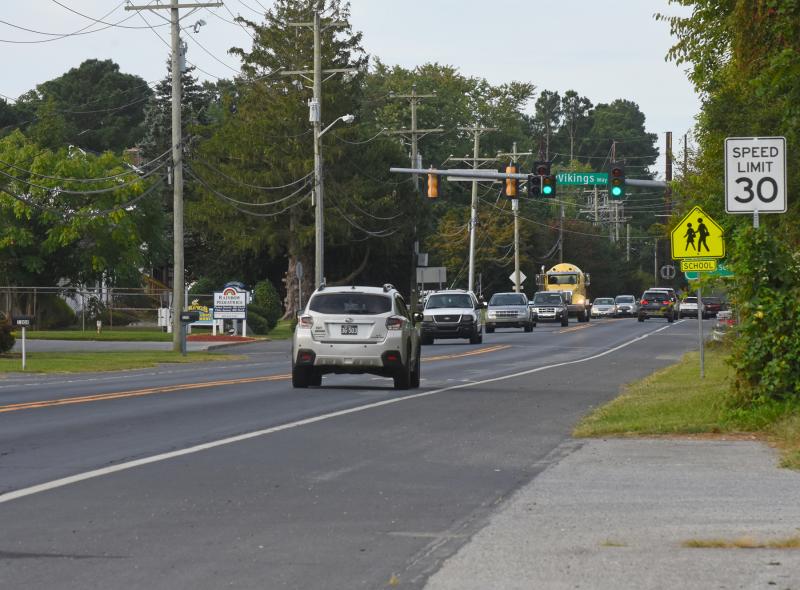Lewes Mayor and City Council would love to welcome 16 new property owners into the city via annexation, but just how to do it remains up for debate.
At council’s Feb. 14 regular meeting, Mayor Ted Becker presented an idea to use American Rescue Plan Act funds to pay for one-third of the cost for property owners to hook into Lewes Board of Public Works’ water and sanitary sewer systems. The $10,000 incentive would be offered to the seven homes immediately east of Vikings Way along Savannah Road.
Vikings Way is property of Cape Henlopen School District, which is not within the city limits, and properties west of the road would have to become contiguous with the city before they could be annexed.
Becker’s idea did not sit well with the majority of council.
“I have multiple problems with this proposal,” said Deputy Mayor Andrew Williams. “I don’t think we should be using our ARPA money on citizens who aren’t already part of our border. I don’t think ARPA money should be used as a carrot for incentivizing.”
The city’s policy is to require annexation or a signed pre-annexation agreement before granting access to BPW services. However, due to the proximity of these 16 homes to the BPW’s well field and Ebenezer Branch, a tributary to Canal Creek, Williams made a motion to waive the annexation requirement and allow residents to hook into the water and sewer systems, and abandon their septic systems.
That idea also didn’t pass muster, failing by a 3-2 vote.
Councilpersons Carolyn Jones and Khalil Saliba each said more information is needed before moving forward with annexation incentives, including a cost-benefit analysis for annexing the properties.
“Why not put this off until we’re smarter on this?” Jones said.
Code changes approved
At the Feb. 14 meeting, mayor and city council approved three ordinances that change several sections of code. Under amended code, the time frame in which homeowners may improve or maintain their home beyond 50 percent of the market value without having to comply with all new rules and regulations drops from 10 years to 1 year. That change received unanimous support from council.
Another ordinance that received a unanimous vote removes references to the historic preservation commission and commercial architectural review commission from the code, since they’ve been combined to form the historic preservation architectural review commission. The ordinance also removes language from the building height section related to homes built prior to 1987 and adds the new joint site development ad hoc review committee to code. Changes to a section related to off-street parking were removed from the ordinance, as work on the issue is ongoing.
A third ordinance changed code to better reflect the roles and responsibilities of the city planner and building inspector. The code did not give any zoning administration authority to the planner, but the planner has been doing many of the tasks assigned to the building official in code for several years.
Freeman-Monroe traffic signal
Mayor and city council voted 3-0 with one abstention and one recusal to approve an installation and maintenance agreement for a traffic signal at the intersection of Monroe Avenue and Freeman Highway. The traffic signal was required as part of the approval for the Olde Town at White’s Pond subdivision. The City of Lewes will assume responsibility for electric cost, estimated at $50 per month.
In September, council agreed to revise a condition for approval to allow no more than 14 homes to be built before the signal is installed. The light will be constructed by the Delaware Department of Transportation.
Short-term rentals committee
Mayor and city council voted unanimously to create an ad hoc committee to study short-term rentals. The city has been working with Host Compliance LLC to identify illegal short-term rentals. Among other tasks, the committee will analyze the different needs of short- and long-term rentals. Based on the committee’s findings, Becker said, the city may have to consider changes to its gross rental receipts tax, which is currently 5 percent.
“A long-term rental property is different than someone who’s here for a week or two,” Becker said.
Evaluations for legal, engineering
By a vote of 3-1 with one abstention, mayor and city council will move forward with annual evaluations for engineering and legal services. Based on the evaluations, the city may determine it is satisfied with services, corrective actions are needed or that a request for proposals is warranted. City Manager Ann Marie Townshend said evaluations should be completed this spring. She expects input from mayor and city council, chairs of committees and commissions, and city staff.



















































